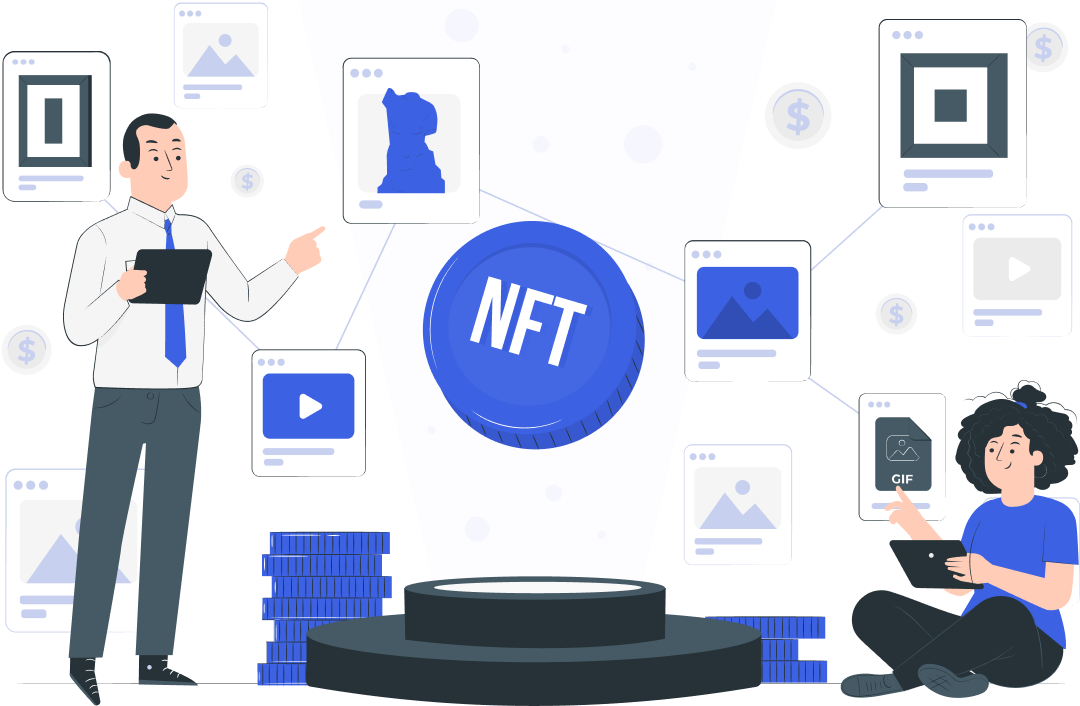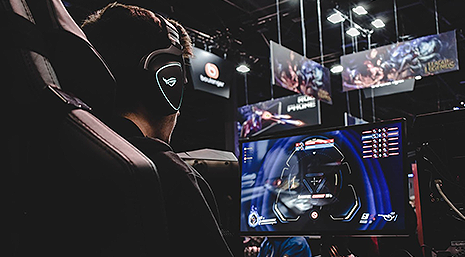GameFi
Join the rapidly growing GameFi sector and partner with ICODA to promote your business and token.
Now applying.Join the rapidly growing GameFi sector and partner with ICODA to promote your business and token.
Now applying.
Imagine a future where people can truly earn money through electronic games. Not just in-game currency, but real cash that can be used to buy food, clothes, and pay bills. Envision a world where all in-game assets like virtual land, clothing, and weapons can be bought and sold in the real world.
This is the core concept behind the development of GameFi, and many active players in the gaming industry believe that this future is not too far off. Of course, GameFi has not fully entered the mainstream yet, which means many people are still unfamiliar with what it is and how it works.
If you share this vision, then please continue reading this article to get all the information about GameFi.

GameFi is the combination of gaming and decentralized finance (DeFi). It is based on the fusion of blockchain technology, the gaming industry, and various DeFi products.
GameFi offers multiple ways for users to earn rewards. Examples include completing tasks, battling other users, or building income-generating structures on their virtual land. Some games even allow users to create income streams without actively participating in the game. In other words, they can stake in-game tokens or earn money by renting them out to other users.
Rewards in GameFi can take various forms depending on the game. They can be in-game items like land or virtual characters, or they can be converted into NFTs (Non-Fungible Tokens) and traded on NFT markets. In-game assets typically provide various benefits to players, such as the ability to earn additional rewards.
The inspiration for GameFi comes from CryptoKitties, a blockchain game platform built on the Ethereum (ETH) network when the concept of NFTs was still relatively unknown.
Subsequently, the NFT industry gained prominence, and during its peak, CryptoKitties had over 15,000 daily users. Unfortunately, the popularity of these NFTs congested the Ethereum blockchain, leading to high transaction fees and long confirmation times.
Developers recognized the need for better blockchain technology to enable faster transactions, scalability, and lower costs. Projects like Polkadot, Solana, and Cardano were some promising ideas.
Then, decentralized finance (DeFi) platforms emerged. The growth of DeFi platforms increased the appeal of GameFi because the new gaming finance systems are entirely based on smart contracts.
This provides players with means to start, sell, lease, or gamble their in-game tokens. This was just the beginning of the “play-to-earn” model.
In addition to gaming rewards, some GameFi projects incorporate elements of decentralized finance (DeFi). Liquidity mining and staking are two major examples that allow users to earn additional income.
For example, staking allows players to use their in-game tokens to earn rewards, obtain unique items, and unlock new game features.
Incorporating DeFi elements also changes the structure of the game, as players holding governance tokens can vote on the game’s future direction, creating a more decentralized game managed by the community rather than large corporations.
Now, let’s delve into the popular GameFi phenomenon known as “Play-to-Earn” (P2E) games.
P2E (Play-to-Earn) is a new way of playing video games and is at the core of all GameFi products. It’s a significant departure from how most games typically operate, where players often have to pay to enjoy the game.
In P2E games, new players usually need to deposit a small amount of funds to get started. Currently, blockchain game developers have to purchase licenses or renew memberships to create video games.
Most traditional online games do not pay participants but rather manage their assets for them. In the P2E paradigm, players have full ownership of their in-game assets as these assets exist in the form of NFTs (Non-Fungible Tokens).
P2E games provide players with complete control, income, and earning opportunities.
Playing GameFi Games
Specific guidelines for each blockchain game may vary, but most games are typically conducted through a web browser. Therefore, to participate in the game, you need to log in using the crypto wallet you set up earlier. To do this, visit the game’s website and find the option to connect your wallet.
This will also serve as your means of logging into the game. Unlike traditional online games, which require you to set up a username and password or provide your email address, blockchain games use your crypto wallet as your account. When connecting your wallet, make sure you are connecting to a legitimate website and not a fake one.
Loading Your Wallet
For those games that do not allow users to earn initial units of cryptocurrency through gameplay, players must load their wallets to actively participate in the game.
The specific cryptocurrency required will be determined by the game and may take some time to obtain the exact cryptocurrency you need.
For example, to start playing the P2E game “Gods Unchained,” you first need to load your wallet with the in-game currency, $GODS.
While loading your wallet typically isn’t too difficult, it’s important to understand that this process can have some complexity.
Understanding Requirements
Most blockchain games require players to purchase cryptocurrency tokens or in-game currency. Each game’s requirements are different, but you must first weigh the income potential against the overall risk.
Next, figure out how long it will take to recoup your initial investment and start collecting rewards. In Axie Infinity, for example, you need to have three Axies in your wallet to start battling. These can be purchased from the in-game marketplace.
Advantages of GameFi and Its Impact on the Gaming Industry
Now that we’ve learned what GameFi is, let’s take a look at its advantages. Some of these may be easy to guess, but let’s explicitly state them:
Players Can Earn Money: Players can participate in blockchain games to earn NFTs and make money. Therefore, blockchain-based games may offer new employment opportunities.
Ownership: NFTs within the game can be integrated into decentralized games, increasing their profit potential and providing players with true asset ownership. Game items are not owned by the game developers, as they can be acquired and exchanged on public blockchain ledgers. Additionally, no in-game items can be counterfeited or altered. Players can ensure the security of all their in-game items, even if the development studio encounters technical difficulties.
Player Empowerment: Game designers do not always respect players’ viewpoints. For example, they have been accused of promoting gender-biased ideas and encouraging users to buy more items. In GameFi projects, users can voice their opinions on various aspects of the game’s future, including startup fees.
Player-Friendly Learning Curve: GameFi projects use basic gaming skills, making them easy to learn and operate. This simple approach lowers the entry barrier, leading to widespread adoption.
Comparison to Traditional Video Games
In traditional video games, users can also collect in-game virtual currency and game assets to help their characters level up. However, these currencies and game items cannot be sold outside of the game. In most cases, their utility outside of the game
We are the team of experts that will support your business at all stages
Website Privacy Policy
Generic privacy policy template
This privacy policy ("policy") will help you understand how Global Digital Consulting LLC uses and protects the data you provide to us when you visit and use https://icoda.io ("website", "service").
We reserve the right to change this policy at any given time, of which you will be promptly updated. If you want to make sure that you are up to date with the latest changes, we advise you to frequently visit this page.
What User Data We Collect
When you visit the website, we may collect the following data:
Why We Collect Your Data
We are collecting your data for several reasons:
Safeguarding and Securing the Data
Global Digital Consulting LLC is committed to securing your data and keeping it confidential. Global Digital Consulting LLC has done all in its power to prevent data theft, unauthorized access, and disclosure by implementing the latest technologies and software, which help us safeguard all the information we collect online.
Our Cookie Policy
Once you agree to allow our website to use cookies, you also agree to use the data it collects regarding your online behavior (analyze web traffic, web pages you spend the most time on, and websites you visit).
The data we collect by using cookies is used to customize our website to your needs. After we use the data for statistical analysis, the data is completely removed from our systems.
Please note that cookies don't allow us to gain control of your computer in any way. They are strictly used to monitor which pages you find useful and which you do not so that we can provide a better experience for you.
Restricting the Collection of your Personal Data
At some point, you might wish to restrict the use and collection of your personal data. You can achieve this by doing the following:
Global Digital Consulting LLC will not lease, sell or distribute your personal information to any third parties, unless we have your permission. We might do so if the law forces us. Your personal information will be used when we need to send you promotional materials if you agree to this privacy policy.
Terms and Conditions
Please read these Terms and Conditions ("Terms", "Terms and Conditions") carefully before using the https://icoda.io website (the "Service") operated by Global Digital Consulting LLC.
Your access to and use of the Service is conditioned on your acceptance of and compliance with these Terms. These Terms apply to all visitors, users and others who access or use the Service.
Links To Other Web Sites
Our Service may contain links to third-party web sites or services that are not owned or controlled by Global Digital Consulting LLC.
Global Digital Consulting LLC has no control over, and assumes no responsibility for, the content, privacy policies, or practices of any third party web sites or services. You further acknowledge and agree that Global Digital Consulting LLC shall not be responsible or liable, directly or indirectly, for any damage or loss caused or alleged to be caused by or in connection with use of or reliance on any such content, goods or services available on or through any such web sites or services.
Changes
We reserve the right, at our sole discretion, to modify or replace these Terms at any time. If a revision is material we will try to provide at least 30 days' notice prior to any new terms taking effect. What constitutes a material change will be determined at our sole discretion.
Contact Us
If you have any questions about these Terms, please contact us.